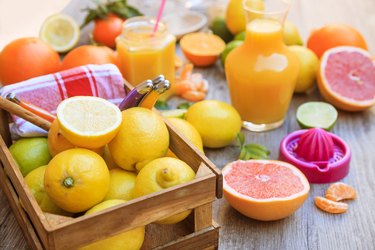
Hives are a sign of an allergic reaction. Not only are they annoying and embarrassing, but they can last for hours or even days, depending on how severe your reaction is. If you break out in hives, you just want to get rid of them as fast as possible.
Medications are the only thing that can quickly save the day, but eating foods that contain certain vitamins or taking these vitamins in supplement form may help. If you decide you want to try vitamin supplements, though, it's important to check with your doctor first.
Video of the Day
Video of the Day
Read more: Hives
Allergic Reaction
While it's not necessarily serious, breaking out in hives can be worrisome. If you don't know what you're allergic to, it's likely even more concerning because you don't know what foods to avoid when you have hives. Although this is annoying, it could be worse. Anaphylaxis is a much more concerning whole-body allergic response that can make it difficult to breathe, according to an article from Medline Plus.
Read more: How to Naturally Treat Hives
When your body has an allergic response to something, your immune system goes into overdrive and releases histamines. These give you the typical symptoms of allergies, such as a runny nose and itchy eyes. They also give you hives and, in extreme cases, anaphylaxis.
Fighting Histamines
To combat this extreme histamine response, you can take antihistamine medications. These act by blocking histamines and stunting the body's immune response. If you're experiencing anaphylaxis and have trouble breathing, you'll have to take a shot of epinephrine from an auto-injector, according to an article from Food Allergy Research & Education.
Hives should go away in 24 hours or less, but a new wave of hives might come in to take their place. If this process continues for six weeks or less, it's considered acute hives. If it lasts longer than six weeks, it's considered chronic and you should see your doctor.
Vitamin D and Hives
At that point, you've probably been taking medication and need an extra boost to help finally get rid of the pesky problem. A study published in the Annals of Allergy, Asthma and Immunology in 2014 found that vitamin D helped participants who had chronic hives.
The researchers found that adding a vitamin D supplement decreased the severity of symptoms by 33 percent. The participants who took a higher dose of 4,000 international units per day had an additional 40 percent reduction in symptoms.
If you're having trouble getting rid of hives, try eating foods rich in vitamin D. Cod liver oil has the most of any food, and swordfish, salmon and tuna aren't far behind. If fish isn't your thing, try fortified orange juice or fortified milk.
Vitamin C and Hives
There's also some evidence that vitamin C can help with rashes like hives. A study published in 2018 in the Journal of International Medical Research suggests that vitamin C reduces allergy symptoms. Vitamin C is an antioxidant, which means it can help decrease inflammation, especially in high doses, as the study showed.
This study included high doses of vitamin C, so a supplement would help the most. However, it wouldn't hurt to eat foods high in vitamin C to boost your levels naturally.
Read more: Are There Certain Fruits to Avoid with Hives?
Foods high in vitamin C include vegetables like broccoli, Brussels sprouts, cauliflower, and green and red peppers. Citrus fruits, as well as cantaloupe and most berries, are high in vitamin C. You can also eat cereals fortified with vitamin C to fight this itchy problem.
- Medline Plus: Hives
- Food Allergy Research & Education: Know the Difference: Epinephrine vs. Antihistimines
- Annals of Allergy, Asthma and Immunology: Beneficial Role for Supplemental Vitamin D3 Treatment in Chronic Urticaria: A Randomized Study
- National Institutes of Health: Vitamin D
- Journal of International Medical Research: Intravenous Vitamin C in the Treatment of Allergies: An Interim Subgroup Analysis of a Long-Term Observational Study
Is this an emergency? If you are experiencing serious medical symptoms, please see the National Library of Medicine’s list of signs you need emergency medical attention or call 911.